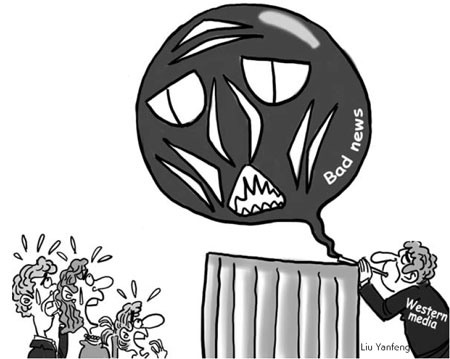
|
OPINION> Commentary
 |
|
Real truth about news business
By Michael J. Economides and Art Horn (China Daily)
Updated: 2008-08-28 07:33 The Beijing Olympics came and went spectacularly, as most of us China watchers had expected, and most Chinese are understandably proud of their country and pleased with how it came through during the Games. But some Chinese cannot resist the temptation to shout to the world, to all those doubting pre-Olympic Thomases: Where were the terrorists? How many people died from our food? How many athletes were impaired by the smog with more world records broken than at any other Olympics in recent memory? Surely many Chinese and perhaps even government officials may attribute the pre-Games adverse publicity to agitators or to people that hate China or racists or even those jealous of the country's recent achievements. But that would be too simplistic and the entire sordid affair may be too hard to understand across cultures. In fact, China's recent headache may actually translate into a cancer and, surprisingly, not in that country but in the West. It says a lot about the press and how it can be relied upon for many things, not just the Beijing Olympics. It may shock many people but the major television networks, newspapers, magazines and other media in the West are not in the truth business, they are in the news business. This is not to say they are in the habitual lying business but what they consider to be news and truth is blurred due to the need to produce a profit in a "climate" of shrinking revenues. "If it bleeds it leads" meaning if the story has blood and drama it will be the first one on the news. For example, global warming stories are now bleeding all over the headlines. So you are telling me all those stories about drowning polar bears, bigger hurricanes, more droughts, increased wild fires and melting polar caps might not be true? Right. News as a money-making private business is by its very nature a compilation of dramatic, captivating and often tragic events. Without those events a newscast would be rather boring to a great many people. Dramatic pictures of life and death events make news exciting and compelling. All of these events are bad news for humanity and the planet but good news for the news business. News organizations are in the bad news business.  Why won't the major television networks and news media give a more balanced view of events? When your job is to generate large numbers of viewers, other priorities dominate. Television news is all about getting the largest audience. The networks love a good disaster story. If stories about a coming disaster will get more people to watch a news program or read a newspaper then that is what you'll see. It is not in the interest of news media to veer from the disaster side of the story. To do so would water down a never-ending source of newsworthy story ideas. Media momentum: we've seen this phenomenon over and over again through the years. Fundamentally, what happens is that if a story is popular and presents new angles that can be exploited each day, month or year it will continue to get air time. After a while the story begins to take on a life of its own. It becomes something that can be relied on to fill time during the news program and generate audience. For instance, back in the middle and late 1980s the AIDS story was breaking. Every newscast had to have an AIDS story in it. This went on for years. Finally when it became apparent that AIDS was not going to affect the vast majority of the population, the story all but disappeared from the news. After a period of time the producers or the managers dump a story if nothing startlingly new develops that can be used to generate audience. They simply leave it by the side of the road and move on. There is never any retrospective of the issue. It is simply forgotten as if it never happened. Old news along with good news is no news. It is not likely that a stream of stories will now appear in the West, critical of the Beijing pre-Games doom and disaster stories. Apologies are not part of their nature. Ever since the early 1980s the numbers of people watching the major networks, especially in the United States, have been dropping. The introduction of cable TV was a double-edged sword. It gave the networks a better, more consistent, picture to viewers but on the other hand helped introduce competition from smaller channels like CNN, the weather channel and ESPN. Then came the Internet allowing people to go even further away. The result is fewer viewers and lower revenue. Disasters real or, especially imagined, are just too good a hook to throw away with objective reporting. Crisis is a word used over and over again. There is a real crisis developing but it is not in AIDS, global warming or the Beijing Olympics. It is in the credibility of magazines, newspapers and television. The tragedy is that presumably responsible politicians and leaders in many Western countries become hostage of alarmist news and thus some outrageous nonsense becomes indistinguishable from reality. Michael J. Economides is the editor-in-chief of the Energy Tribune, and Art Horn is a meteorologist who has worked for CBS, ABC, NBC and PBS (China Daily 08/28/2008 page9) |